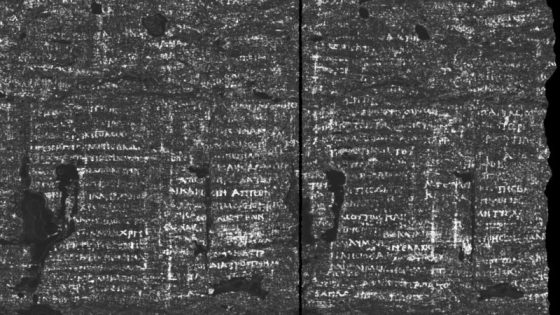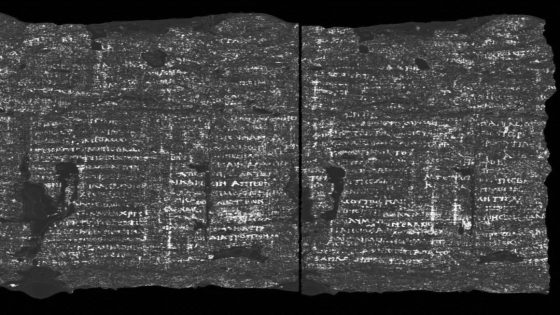Scholars have recently made significant progress in deciphering ancient texts, revealing the first words from a Herculaneum scroll that was burned and buried during the eruption of Mount Vesuvius in AD 79. The word “disgust,” written in ancient Greek, has emerged from the scroll, which is part of a broader initiative utilizing artificial intelligence to decode lost artifacts.
- AI decodes ancient Herculaneum scrolls.
- Asteroid Bennu could cause global winter.
- Archaeologists discover last Anglo-Saxon king's home.
- Darwin’s frogs successfully reproduce in captivity.
- Light pollution affects global star visibility.
- New insights on turbulence in physics.
The Herculaneum scrolls, discovered in the 18th century, are among the few surviving texts from the ancient world. These scrolls were carbonized during the catastrophic eruption, making them extremely fragile and difficult to study. Recent advancements in imaging technology and artificial intelligence have allowed researchers to virtually unroll and read these delicate artifacts without physical damage.
Key details about the Herculaneum scrolls include:
- Discovered in the 1750s in Herculaneum, Italy.
- Five intact scrolls have been virtually unrolled using AI techniques.
- Researchers are part of the Vesuvius Challenge, aimed at decoding these ancient texts.
The scrolls are believed to contain philosophical and literary works, providing invaluable insights into ancient Roman and Greek thought. The specific chemical composition of the ink used on this scroll has made it easier to read through advanced imaging techniques, although the exact ingredients remain unknown. As technology continues to evolve, the potential for uncovering more lost knowledge from these ancient texts grows, offering a deeper understanding of history.
In summary, the deciphering of the Herculaneum scrolls represents a significant achievement in the field of archaeology and history. As researchers continue to apply innovative technologies, more ancient texts may be revealed, enriching our understanding of the past.

































